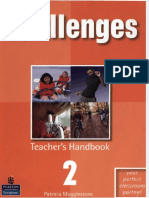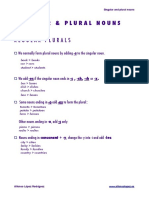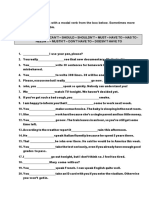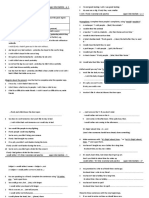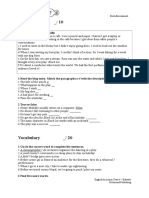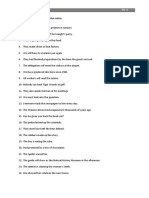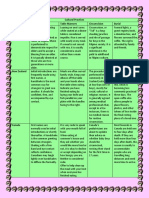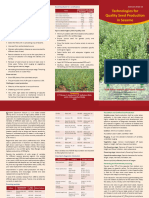Present Perfect / Past Perfect / Past Simple / Past Continuous
Present Perfect / Past Perfect / Past Simple / Past Continuous
Uploaded by
selma gpdCopyright:
Available Formats
Present Perfect / Past Perfect / Past Simple / Past Continuous
Present Perfect / Past Perfect / Past Simple / Past Continuous
Uploaded by
selma gpdOriginal Title
Copyright
Available Formats
Share this document
Did you find this document useful?
Is this content inappropriate?
Copyright:
Available Formats
Present Perfect / Past Perfect / Past Simple / Past Continuous
Present Perfect / Past Perfect / Past Simple / Past Continuous
Uploaded by
selma gpdCopyright:
Available Formats
PRESENT PERFECT / PAST PERFECT / PAST SIMPLE / PAST CONTINUOUS
1. Change these sentences into
a) the past simple, b) past continuous, c) present perfect and d) the past perfect.
1. I work in a supermarket.
2. My father lives in Las Vegas.
3. Lisa cooks pasta for everybody.
4. Candice buys old dolls at street markets. (muñecas)
5. Tom and Tina write books for children.
6. We leave school late.
7. You speak too fast.
2. Write the sentences in the negative.
1. I worked in a supermarket.
2. My father lived in Las Vegas.
3. Lisa was cooking pasta for everybody.
4. Candice and I were buying old dolls.
5. Tom and Tina have written books for children.
6. She has done all the exercises.
7. You had spoken too fast.
8. They had told many lies (mentiras)
3. Write questions for these answers.
1. I bought the book yesterday.
2. I found a doll in the park.
3. I was reading People magazine.
4. They were living in Manchester then,
5. I have been at home all day.
6. We have lived in this house for six years.
7. He had stolen a car.
8. He had lost his job three months before.
4 Choose the correct words. 5 Complete the sentences with:
1 They’ve already / yet visited Venice. yet ago ever last night for since
2 Have you ever / never seen a ghost? 1 John has lived in London ...................... 1995.
3 Has she finished work just / yet? 2 I haven’t finished my homework ......................
4 They’ve been married for / since October. 3 What time did you go to bed ...................... ?
5 Lucy has worked in the circus since / for she was a child. 4 Have you ...................... eaten Chinese food?
6 David has just / yet got back from holiday. 5 My parents flew to Paris 10 days ......................
6 We have lived in the same house.......... many
years.
6 Complete the sentences with the Past Simple or Present Perfect of the verbs in brackets.
1 We ................................... (watch) a great film last night.
2 I ...................... never ...................... (eat) such a tasty meal!
3 My family and I ................................... (move) to a new flat last month.
4 ...................... you ...................... (play) tennis yesterday?
5 I miss Sophie. I ................................... (not see) her for five years.
6 I ...................... just ...................... (finish) my homework.
7 I was tired, so I ...................................... (sleep) late last Saturday morning.
8 How long ...................... you ...................... (have) this puppy?
9 I ...................................... (speak) to my friends on the phone last night.
10 ...................... you ...................... (see) my pen? I can’t find it.
11 Colin ...................................... (never break) any windows with his soccer ball.
7 Choose the correct tense (Simple Past or Past Perfect).
1. They (show) _____________________me the pictures, they (take) ____________________during their holidays.
2. In the evening, the children (tell) ______________ their daddy what they (see) __________________at the zoo.
3. The boy (be)_____________ very sorry for what he (do) _____________________________
4. My friend (eat) _________________________ up all the biscuit we (bake) __________________
5. The teacher (correct) __________________________ the tests we (write) ______________________
6. I (give) __________________________them some of the candies I (buy) _______________________
7. My sister (see / not) _________________________ the note that I (leave) ____________________on the kitchen
table for her.
8. We (want) _____________________ to watch a film that we (see / not) _____________________ before.
9. When Simon (go) ___________ out to play, he (do) __________________ his homework.
10. Before that day in winter, the African boy (not/see) ______________________________snow in his life.
11. She (give) ___________________me the book that she (read) _______________________
12. We (go)_______________________ to London because the Queen (invite)____________________ us for tea.
ANSWERS
1.
Past simple Past continuous Present perfect Past perfect
1. I worked in a 1. I was working in a 1. I have worked in a 1. I had worked in a
supermarket. supermarket. supermarket. supermarket.
2. My father lived in 2. My father was living in Las 2. My father has lived in 2. My father had lived in
Las Vegas. Vegas. Las Vegas. Las Vegas.
3. Lisa cooked pasta for 3. Lisa was cooking pasta for 3. Lisa has cooked pasta 3. Lisa had cooked pasta
everybody. everybody. for everybody. for everybody.
4. Candice bought old 4. Candice was buying old dolls 4. Candice has bought old 4. Candice had bought old
dolls at street at street markets. dolls at street markets. dolls at street markets.
markets. 5. Tom and Tina were writing 5. Tom and Tina have 5. Tom and Tina had
5. Tom and Tina wrote books for children. written books for written books for
books for children. 6. We were leaving school children. children.
6. We left school late. late. 6. We have left school late. 6. We had left school late.
7. You spoke too fast. 7. You were speaking too fast. 7. You have spoken too …. 7. You had spoken too fast.
2.
1. I didn’t work in a supermarket. 3.
2. My father didn’t live in Las Vegas. 1. When did you buy the book?
3. Lisa wasn’t cooking pasta for everybody. 2. What did you find in the park?
4. Candice and I weren’t buying old dolls. 3. What were you doing?
5. Tom and Tina haven’t written books for children. 4. Where were they living?
6. She hasn’t done all the exercises. 5. Where have you been all day?
7. You hadn’t spoken too fast. 6. How long have you lived in this house?
8. They hadn’t told many lies (mentiras) 7. What had he stolen?
8. When has he lost his job?
4 1 already 5 1 since 6 1. watched 7 1. showed, had taken
2 ever 2 yet 2. have never eaten 2. told, had seen
3 yet 3 last night 3. moved 3. was, had done
4 since 4 ever 4. did you play 4. ate, had baked
5 since 5 ago 5. haven’t seen 5. corrected, had written
6 just 6 for 6. have just finished 6. gave, had bought
7. slept 7. didn’t see , had left
8. have you had 8. wanted, hadn’t seen
9. spoke 9. went, had done
10. have you seen 10. had not seen
11. Has never broken 11. gave, had read
12. went, had invited
You might also like
- Am Headway 4 Workbook Answer KeyDocument29 pagesAm Headway 4 Workbook Answer KeyDanu70% (40)
- Unit 3: Can/can't Adverbs of Manner Have To/don't Have To, Must/mustn'tDocument1 pageUnit 3: Can/can't Adverbs of Manner Have To/don't Have To, Must/mustn'tpaola Joaquín lealNo ratings yet
- Progress Test Level A2Document5 pagesProgress Test Level A2Dobre CarmenNo ratings yet
- EBAU Mur - Stop Trying To ChangeDocument3 pagesEBAU Mur - Stop Trying To ChangeLucia Garcia CoyNo ratings yet
- Unit 1: Oral Comprehension ScriptsDocument1 pageUnit 1: Oral Comprehension ScriptsCris GarciaNo ratings yet
- PastDocument1 pagePastNeyser Alayo GermanNo ratings yet
- Challenges 2 (Teacher's Handbook)Document132 pagesChallenges 2 (Teacher's Handbook)selma gpd100% (4)
- Kristy Thomas 2Document2 pagesKristy Thomas 2raulbmNo ratings yet
- Singular & Plural Nouns: Regular PluralsDocument4 pagesSingular & Plural Nouns: Regular PluralsJessica ramirez illpaNo ratings yet
- Relative Clauses - Divide Into 2 Parts Easy/hardDocument14 pagesRelative Clauses - Divide Into 2 Parts Easy/hardgustavo antonNo ratings yet
- Inglés 6 - Examen y Criterios de Corrección PDFDocument2 pagesInglés 6 - Examen y Criterios de Corrección PDFMacarenaNo ratings yet
- Mod 003Document4 pagesMod 003Yoon Hee ImNo ratings yet
- Reduced Relative Clauses Consolidation WorksheetDocument5 pagesReduced Relative Clauses Consolidation WorksheetAntony HenningsNo ratings yet
- Participial Phrases PracticeDocument2 pagesParticipial Phrases PracticeChap ChanmonyNo ratings yet
- The Past PerfectDocument3 pagesThe Past PerfectMai Rodas100% (1)
- Magic 100 and Key!Document12 pagesMagic 100 and Key!Lucía Di CarloNo ratings yet
- Used To and Would Exercises Grammar Drills Grammar GuidesDocument1 pageUsed To and Would Exercises Grammar Drills Grammar GuidesMeli PasikNo ratings yet
- Answerkey For PET Test 1Document1 pageAnswerkey For PET Test 1CLARIBEL MARIA CHAVEZ GOMEZNo ratings yet
- ESL Short-Reading Intermediate. The Burglars' FriendDocument1 pageESL Short-Reading Intermediate. The Burglars' FriendKris FonteynNo ratings yet
- I Wish If Only Id Rather Its Time G PDocument3 pagesI Wish If Only Id Rather Its Time G PMateo VillalobosNo ratings yet
- Present Perfect Vs Past SimpleDocument1 pagePresent Perfect Vs Past Simplemmarijanamavic100% (1)
- Past Perfect TenseDocument9 pagesPast Perfect TenseCamila MalagonNo ratings yet
- Level 1 Grammar Extension 1 4Document1 pageLevel 1 Grammar Extension 1 4hector hernanaNo ratings yet
- Achievement Test Unit 1 English Adventure 4Document5 pagesAchievement Test Unit 1 English Adventure 4Maepardo0% (1)
- Revision For Unit123Document5 pagesRevision For Unit123Hồ Hà100% (1)
- Unit 3: Exercise 1: Match The Words With The Pictures. Use The Words in The BoxDocument11 pagesUnit 3: Exercise 1: Match The Words With The Pictures. Use The Words in The BoxĐoàn Văn Tiến100% (1)
- The Passive Exercises-Mixed Tenses and Two ObjectsDocument3 pagesThe Passive Exercises-Mixed Tenses and Two ObjectsYOUSRA KESSINo ratings yet
- Order of Adjectives Exercise 1Document2 pagesOrder of Adjectives Exercise 1Sander Zuir MusicNo ratings yet
- Will (Advanced Uses)Document5 pagesWill (Advanced Uses)Laura Paola Torres DíazNo ratings yet
- Past Simple Past ContinuousDocument4 pagesPast Simple Past Continuousjot100% (1)
- Correcting Mistakes: Name: Date: Class: TeacherDocument2 pagesCorrecting Mistakes: Name: Date: Class: TeacherlizandrewNo ratings yet
- Although, Though, Despite, in Spite Of, and However - Grammar ExerciseDocument4 pagesAlthough, Though, Despite, in Spite Of, and However - Grammar ExerciseKlau LuisNo ratings yet
- Ket Reading and Writing Part 4 Exam 2Document1 pageKet Reading and Writing Part 4 Exam 2Rebeca Muñoz Muñoz67% (3)
- Rephrasing Angloschool PDFDocument3 pagesRephrasing Angloschool PDFanamelgarNo ratings yet
- EIM4 Test 1 ReinforcementDocument6 pagesEIM4 Test 1 ReinforcementesthernerjaNo ratings yet
- Enough, Too, So, SuchDocument4 pagesEnough, Too, So, SuchHồng Vân Lê ThịNo ratings yet
- Complaint Letter B1 LevelDocument1 pageComplaint Letter B1 Levelbbalint 25No ratings yet
- Simple Past ExerciseDocument3 pagesSimple Past ExerciseDzajo5No ratings yet
- Present Perfect Tense Simple Past TenseDocument3 pagesPresent Perfect Tense Simple Past TenseAsif AliNo ratings yet
- 1 BachilleratoDocument45 pages1 BachilleratoPaula M. CánovasNo ratings yet
- OA2 1a GrammarDocument24 pagesOA2 1a GrammarRobert AlexNo ratings yet
- Pre Intermediate Level 2 7 Materials - Esl.loungeDocument14 pagesPre Intermediate Level 2 7 Materials - Esl.loungeMona AbdellatifNo ratings yet
- Used To - Would - Exercises+keysDocument5 pagesUsed To - Would - Exercises+keysOlgaNo ratings yet
- Gerunds InfinitivesDocument2 pagesGerunds InfinitivesRocio Ruiz MarchenaNo ratings yet
- b1 Extra Vocabulary and Grammar Activities 0Document18 pagesb1 Extra Vocabulary and Grammar Activities 0Elena PopescuNo ratings yet
- English Grammar in Use 2020-184-185 PDFDocument2 pagesEnglish Grammar in Use 2020-184-185 PDFMeiling Fu100% (1)
- III (2) Subjunctive Mood STDocument30 pagesIII (2) Subjunctive Mood STgocan12-1No ratings yet
- Future Tenses PDFDocument2 pagesFuture Tenses PDFEsther de RiviaNo ratings yet
- Reported Yes / No Questions: Present SimpleDocument3 pagesReported Yes / No Questions: Present SimpleIsa AlonsoNo ratings yet
- bài tậpDocument19 pagesbài tậpPhong Đặng100% (1)
- Direct and Indirect Speech ExercisesDocument7 pagesDirect and Indirect Speech ExercisesRito Eduardo Escobar Escobedo0% (1)
- Inglés 1º Bach Pte Cuaderno-Refuerzo-Inglés-Pte-1º-BachDocument22 pagesInglés 1º Bach Pte Cuaderno-Refuerzo-Inglés-Pte-1º-Bachalvapazos326No ratings yet
- Extra Exercises - Book 2 - Pronouns ReviewDocument4 pagesExtra Exercises - Book 2 - Pronouns ReviewAndressa Amorim De SousaNo ratings yet
- Reported Speech - Present TensesDocument1 pageReported Speech - Present TensesCarlos Mendes0% (1)
- Greetings From Italy Interactive Version Student ADocument1 pageGreetings From Italy Interactive Version Student AKarla RendonNo ratings yet
- Compact TestDocument2 pagesCompact Testhai voNo ratings yet
- Present Perfect Past Perfect Past SimpleDocument2 pagesPresent Perfect Past Perfect Past SimpleNajib YusofiNo ratings yet
- Task 1: Give The Correct Forms of Verb in The Past Simple TenseDocument3 pagesTask 1: Give The Correct Forms of Verb in The Past Simple TenseNhư LạiNo ratings yet
- Practice For The Control WorkDocument2 pagesPractice For The Control WorkIvana BozickovicNo ratings yet
- Present Past PerfectDocument2 pagesPresent Past PerfectRenato M Ueoka0% (1)
- Guide y Activity 8Document6 pagesGuide y Activity 8Brayan Estiven Gutierres ZalazarNo ratings yet
- Grammar Basics: Getting StartedDocument4 pagesGrammar Basics: Getting StartedAlda RojasNo ratings yet
- Stephen Bailey - Academic Writing - A Handbook For International Students-Routledge (2004) - 34-36Document3 pagesStephen Bailey - Academic Writing - A Handbook For International Students-Routledge (2004) - 34-36selma gpdNo ratings yet
- Past Simple Past Perfect Basic 3Document3 pagesPast Simple Past Perfect Basic 3selma gpdNo ratings yet
- Order of Events Order of AccountDocument2 pagesOrder of Events Order of Accountselma gpdNo ratings yet
- Challenges 2 Test BookDocument65 pagesChallenges 2 Test Bookselma gpdNo ratings yet
- Garlic Fingers and Donair SauceDocument2 pagesGarlic Fingers and Donair Saucehana cadNo ratings yet
- Scites1 Biodiversity Nomer Rivera AbbDocument2 pagesScites1 Biodiversity Nomer Rivera AbbNOMER LIANDEL RIVERANo ratings yet
- Cattle Counting Ceremony Among The Wolaita EthiopiDocument15 pagesCattle Counting Ceremony Among The Wolaita Ethiopiananiyademirew1No ratings yet
- Copia de AK-PasiveVoice-ExercisesDocument8 pagesCopia de AK-PasiveVoice-ExercisesAlberto Martínez Castaño100% (1)
- Laporan Praktikum TPHP Ke-6Document10 pagesLaporan Praktikum TPHP Ke-6Riska Ayu NuryahyaNo ratings yet
- Project Proposal For Broiler ProductionDocument2 pagesProject Proposal For Broiler ProductionAlejandro C. Dizo100% (1)
- Barangay Profile 2. Geographical, Agricultural and Socio-Economic Situation 2020Document2 pagesBarangay Profile 2. Geographical, Agricultural and Socio-Economic Situation 2020SK TIMBANGANNo ratings yet
- Summarized Research PresentationDocument4 pagesSummarized Research PresentationDaryl A. Dela CruzNo ratings yet
- 1activepassive-Rephrasing 23878Document2 pages1activepassive-Rephrasing 23878Isabel RamalloNo ratings yet
- Group 7Document14 pagesGroup 7Phấn NguyễnNo ratings yet
- LKS 2 ptk2Document4 pagesLKS 2 ptk2nurinuryaniNo ratings yet
- Algae As Novel Food in EuropeDocument17 pagesAlgae As Novel Food in EuropeSónia CostaNo ratings yet
- Carmien Teatox-Guide 2021Document4 pagesCarmien Teatox-Guide 2021A LouwNo ratings yet
- 1 - Nouns Student PDFDocument11 pages1 - Nouns Student PDFJessica Diaz GuadalupeNo ratings yet
- KannadaLessons Videos 1Document21 pagesKannadaLessons Videos 1sizzy9911No ratings yet
- Industrial BiotechnologyDocument9 pagesIndustrial BiotechnologyRohailNo ratings yet
- Atomic HabitsDocument12 pagesAtomic Habitshannanshakeel1867No ratings yet
- Đề Thi Thử THPT 2021 - Tiếng Anh - GV Vũ Thị Mai Phương - Đề 15 - Có Lời GiảiDocument16 pagesĐề Thi Thử THPT 2021 - Tiếng Anh - GV Vũ Thị Mai Phương - Đề 15 - Có Lời GiảiHanh Yen100% (1)
- Writing Samples 2024Document20 pagesWriting Samples 2024Omar el GladNo ratings yet
- Gobardhan MajhiDocument64 pagesGobardhan MajhiAkash OramNo ratings yet
- Encanto Grade 5 Script - 22 - 23Document18 pagesEncanto Grade 5 Script - 22 - 23aryanddoshiNo ratings yet
- Cultural Practices Country Greetings Table Manners Circumcision Burial PhilippinesDocument2 pagesCultural Practices Country Greetings Table Manners Circumcision Burial PhilippinesMeriel Franco GalangNo ratings yet
- Sesame Seed in IndiaDocument2 pagesSesame Seed in IndianamakuuniqNo ratings yet
- Letter Invites - Convoy of HopeDocument2 pagesLetter Invites - Convoy of HopeJulyo Na LangNo ratings yet
- Easy Tortilla SoupDocument1 pageEasy Tortilla SoupShelby SheppardNo ratings yet
- Abacus Advance ENGDocument16 pagesAbacus Advance ENGthomasUsernameNo ratings yet
- Egg DishDocument15 pagesEgg DishThea Jeonieesa GarayNo ratings yet
- Internship ReportDocument42 pagesInternship Reportm bilalNo ratings yet
- Probnoe Testirovanie 3 Angliyskiy Yazyk PDFDocument28 pagesProbnoe Testirovanie 3 Angliyskiy Yazyk PDFБатырхан Сайдаханов (Batyr Doctor)No ratings yet






